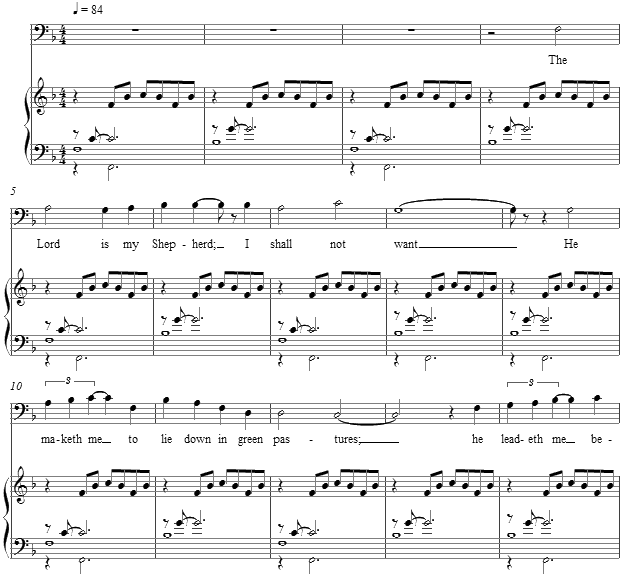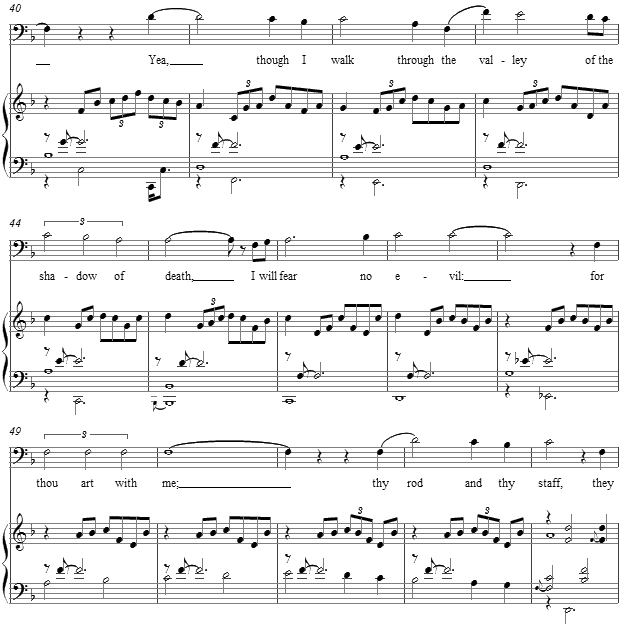Music and Texts of GARY BACHLUND
Vocal Music | Piano | Organ | Chamber Music | Orchestral | Articles and Commentary | Poems and Stories | Miscellany | FAQs
The Lord Is My Shepherd - (2008)
for baritone and harp (or piano)
for baritone Edwin Crossley-Mercer
Psalm 23 in the King James Version (1611)
1 [A Psalm of David.] The LORD is my shepherd; I shall not want.
2 He maketh me to lie down in green pastures: he leadeth me beside the still waters.
3 He restoreth my soul: he leadeth me in the paths of righteousness for his name's sake.
4 Yea, though I walk through the valley of the shadow of death, I will fear no evil: for thou art with me; thy rod and thy staff they comfort me.
5 Thou preparest a table before me in the presence of mine enemies: thou anointest my head with oil; my cup runneth over.
6 Surely goodness and mercy shall follow me all the days of my life: and I will dwell in the house of the LORD for ever.
[ 5 pages, circa 4' 45" ]
While discussing various students and colleagues which my wife, Marilyn, has worked, she spoke highly of a young professional whom she had met, and whom she had coached during his time at the Hanns Eisler Hochschule and in some productions at the Staatsoper in Berlin. I suggested I would compose something for this fine young baritone, and when they spoke he suggested the Twenty-Third Psalm. We settled quickly on the refined English of the original King James version of 1611.
By repeating some text, I formed the verses into a standard song form, A-A'-B-and A'', the vocal line rising highest at the mention of that most human experience, facing death. Therefore the remainder of a gently shaped vocal line remains in the mid-voice range. A repeated, quasi-minimalist pattern repeats in the right hand while the left changes harmonic underpinning in a harmonic rhythm equal to the length of each measure. It is therefore a most simple setting of this beloved text. The score shows no dynamics, which are left to the performers, wholly dependent on in what venue this might be performed. A more resonant acoustic such as a church as opposed to a recital venue might require changes which performers are best able to judge.
As the "bridge" section of this setting rises to the highest tessitura of the voice, a subtext is suggested for the singer in which one's own relationship and awareness of this "valley of the shadow of death" is shown is recommended. There is drama in these words, as one sees in the many uses of this favorite psalm in funeral settings.
Edwin Crossley-Mercer
Born in 1982, Edwin Crossley-Mercer first studied the clarinet and singing at the same time as his German studies. In 2000 he entered the Versailles Centre de Musique Baroque, going on to further study in nineteenth-century repertoire. He has studied interpretation with Julia Varady as well as participating in master classes of Thomas Quasthoff, Wolfram Rieger, Ruben Lifschitz, Udo Reinemann et Dietrich Fischer- Dieskau. In 2006 he debuted at the Staatsoper Unter den Linden in Der Freischütz. He has performed in Roméo et Juliette, Eugene Onegin, Persée, Die Zauberflöte, Don Giovanni, Ariadne auf Naxos, Der Freischütz, Die lustige Witwe, and well as in concert works such as the St. John Passion. Crossley-Mercer has recorded Charpentier motets and Lully ariasand recently completed concerts in Hong Kong and China, and sings his first Gugliemo in Aix-en-Provence 2008. Festivals at which he has appeared include the Festspiele Mecklenburg-Vorpommern, and Aix-en- Provence.
The score for The Lord Is My Shepherd is available as a free PDF download (in either Europe's A4 format or the US standard of 8½ x 11), though any major commercial performance or recording of the work is prohibited without prior arrangement with the composer. Click on the graphic below for this piano-vocal score.


